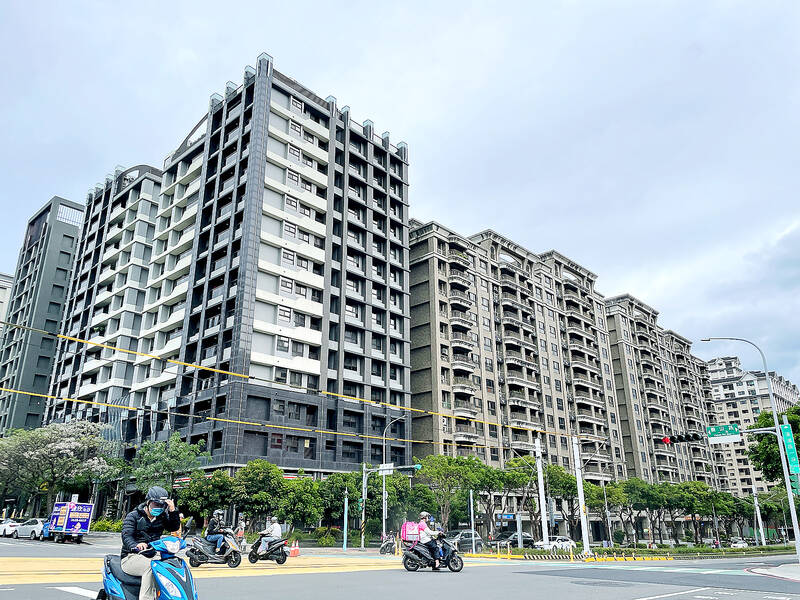The climate monitor for presale and newly completed homes last month remained “green” in the north for the 13th consecutive month, but showed signs of slowdown as developers postponed projects, the Chinese-language My Housing Monthly said on Thursday.
The confidence reading printed 45.7, shedding 6.1 points from July as developers and builders put off projects for Ghost Month, which this year was from July 29 to Aug. 26 and is typically an unfavorable period for doing business, the property research publication said.
The score was the lowest this year, but the gauge remained in a steady growth zone, it said.

Photo: Hsu Yi-ping, Taipei Times
“Economic uncertainty and interest rate hikes are weakening sentiment, but the supply side refuses to lower prices,” My Housing Monthly research manager Ho Shih-chang (何世昌) said.
However, developers postponed launching new projects to ease selling pressures, Ho said.
The approach appeared to be working, but might not be sustainable if developers return to active promotion in the upcoming season starting on Sept. 28 and sales disappoint, the analyst said.
New presale projects last month were expected to generate NT$70 billion (US$2.28 billion) of total revenue with two projects valued at more than NT$1.5 billion in Taipei’s Beitou (北投) and Wanhua (萬華) districts, and eight in New Taipei City’s Sanchong (三重), Linkou (林口), Tamsui (淡水) and Taishan (泰山) districts, the report said.
My Housing Monthly defines projects of more than NT$1.5 billion as major in scale. Only six projects met that criterion in Taoyuan and Hsinchu City, and none in Keelung or Yilan County.
Sales rates shrank from 2.6 deals to 2.2 deals per week last month, while reception sites met with 22 groups of potential buyers per week, down from 28 in July, it said, adding that interest was sluggish Keelung and Yilan.
Newly completed homes amounted to 400 apartment units with only one complex in Keelung valued at more than NT$1.5 billion, it said.
However, concession rates fell 0.27 percentage points to 10.49 percent, as developers showed no intention of conceding to facilitate transactions, Ho said, adding that the inflexible stance was due to the absence of selling pressure.
Rather, developers are seeking to find buyers online, with the number of projects for sale online rising to 1,024 projects, Ho said.

UNCERTAINTY: Innolux activated a stringent supply chain management mechanism, as it did during the COVID-19 pandemic, to ensure optimal inventory levels for customers Flat-panel display makers AUO Corp (友達) and Innolux Corp (群創) yesterday said that about 12 to 20 percent of their display business is at risk of potential US tariffs and that they would relocate production or shipment destinations to mitigate the levies’ effects. US tariffs would have a direct impact of US$200 million on AUO’s revenue, company chairman Paul Peng (彭雙浪) told reporters on the sidelines of the Touch Taiwan trade show in Taipei yesterday. That would make up about 12 percent of the company’s overall revenue. To cope with the tariff uncertainty, AUO plans to allocate its production to manufacturing facilities in

TAKING STOCK: A Taiwanese cookware firm in Vietnam urged customers to assess inventory or place orders early so shipments can reach the US while tariffs are paused Taiwanese businesses in Vietnam are exploring alternatives after the White House imposed a 46 percent import duty on Vietnamese goods, following US President Donald Trump’s announcement of “reciprocal” tariffs on the US’ trading partners. Lo Shih-liang (羅世良), chairman of Brico Industry Co (裕茂工業), a Taiwanese company that manufactures cast iron cookware and stove components in Vietnam, said that more than 40 percent of his business was tied to the US market, describing the constant US policy shifts as an emotional roller coaster. “I work during the day and stay up all night watching the news. I’ve been following US news until 3am

COLLABORATION: Given Taiwan’s key position in global supply chains, the US firm is discussing strategies with local partners and clients to deal with global uncertainties Advanced Micro Devices Inc (AMD) yesterday said it is meeting with local ecosystem partners, including Taiwan Semiconductor Manufacturing Co (TSMC, 台積電), to discuss strategies, including long-term manufacturing, to navigate uncertainties such as US tariffs, as Taiwan occupies an important position in global supply chains. AMD chief executive officer Lisa Su (蘇姿丰) told reporters that Taiwan is an important part of the chip designer’s ecosystem and she is discussing with partners and customers in Taiwan to forge strong collaborations on different areas during this critical period. AMD has just become the first artificial-intelligence (AI) server chip customer of TSMC to utilize its advanced

Six years ago, LVMH’s billionaire CEO Bernard Arnault and US President Donald Trump cut the blue ribbon on a factory in rural Texas that would make designer handbags for Louis Vuitton, one of the world’s best-known luxury brands. However, since the high-profile opening, the factory has faced a host of problems limiting production, 11 former Louis Vuitton employees said. The site has consistently ranked among the worst-performing for Louis Vuitton globally, “significantly” underperforming other facilities, said three former Louis Vuitton workers and a senior industry source, who cited internal rankings shared with staff. The plant’s problems — which have not